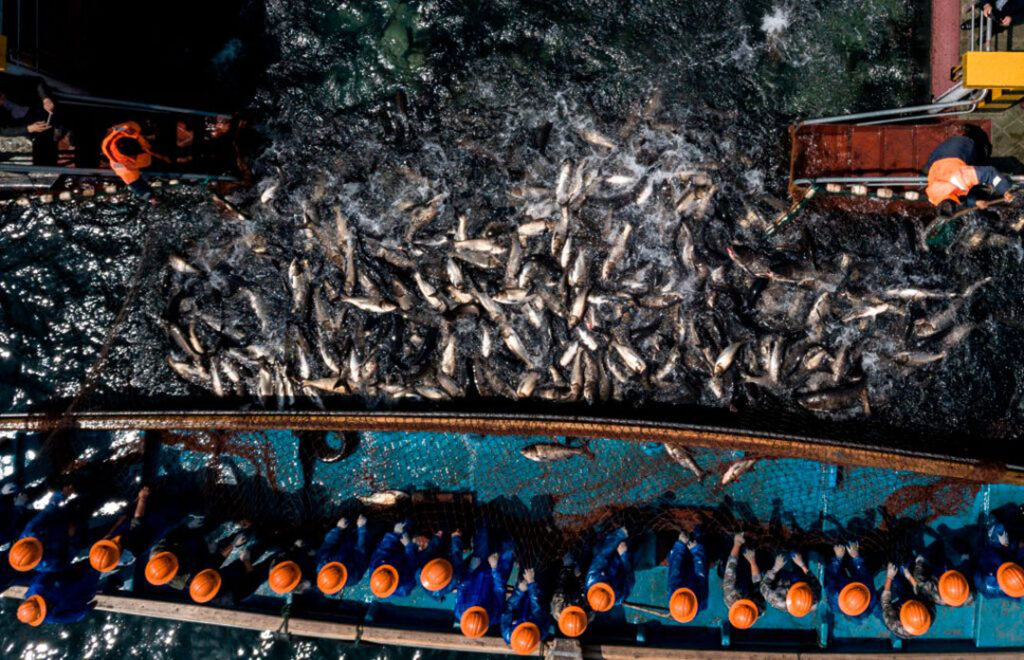ADF STAFF
Experts point to China’s enormous fishing fleet as a cause of economic and environmental harm around the world.
Since China began building its distant-water fishing fleet in the mid-1990s, it has become the world’s worst illegal, unreported and unregulated (IUU) fishing offender, according to the Global Initiative Against Transnational Crime.
IUU fishing is particularly harmful in West Africa where it has led to poverty and unemployment. According to Greenpeace, Guinea, Guinea-Bissau, Mauritania, Senegal, Sierra Leone and The Gambia lost about $2.3 billion a year from 2010 to 2016 due to IUU fishing.
In Ghana, illicit fishing threatens to destroy small pelagic fish populations such as sardinella, which has dropped 80% in the past two decades, the Environmental Justice Foundation reported.
More than 100,000 fishermen and 11,000 canoes operate in Ghana, and its fisheries support the livelihoods of more than 2.7 million people, Steve Trent, executive director of the foundation, told ADF in an email.
“Fish populations [in Ghana] are in steep decline, driven, in large part, by widespread illegal fishing by Chinese-owned industrial trawlers,” Trent said.
IUU fishing helps finance three Chinese fishmeal factories in The Gambia. Residents in the coastal town of Gunjur say dead whales, turtles, dolphins, eels and rays have been washing ashore since the Golden Lead fishmeal factory opened in 2016. A year after the factory opened, a nearby lagoon changed color, and its birds and fish started dying, according to Quartz Africa.
The Gambian National Environment Agency ordered the factory’s waste pipe removed after locals complained it was dumping wastewater into the ocean. A couple of months later, the factory installed a new pipe at the center of Gunjur Beach, raising a Chinese flag during the process.
“When they planted a flag on our beach like that, we really saw this as an insult,” one resident told Quartz Africa. “While we are not against investment in the area, we do ask that these things are undertaken responsibly and that they do not cause harm to our people or the environment.”
On the water, Chinese trawlers have established an aggressive reputation.
Three Mauritanian fishermen were killed in Atlantic waters off Nouadhibou when their boat was struck and sunk by a large Chinese trawler in September. The same month, the captain of a Senegalese fishing boat was beaten and burned when he boarded a Chinese trawler to confront the crew over its dangerous maneuvers.
“Before I could finish speaking, a shower of blows descended on me,” the captain said in a report on seneweb.com. “Then they sprayed me with gasoline and burned me.”
China says its distant-water fishing fleet has 2,600 boats, but studies such as one by the Overseas Development Institute say the number is closer to 17,000.
China’s fleet isn’t interested in just catching fish.
The nation strengthens its influence on the world’s oceans through the People’s Armed Forces Maritime Militia, which is activated on demand to secure strategic maritime locations, often in Malaysia, the Philippines, Taiwan and Vietnam.
Over the past five years, China has bolstered the militia, hiring more experienced and better-paid crews to staff its vessels, which are equipped with mast-mounted water cannons for spraying rival ships and reinforced steel hulls for ramming, according to maritime-executive.com.
An arm of the People’s Liberation Army, the maritime militia typically delivers supplies to Chinese outposts and spies on and reports the activities of rival nations in contested areas, but it is notorious for attempting to intimidate other vessels, according to a report on foreignpolicy.com.
China’s huge fleet largely is funded by government subsidies. No other nation spends more on fishing subsidies than China, which paid $7.2 billion — about 21% of the global total — in 2018.

